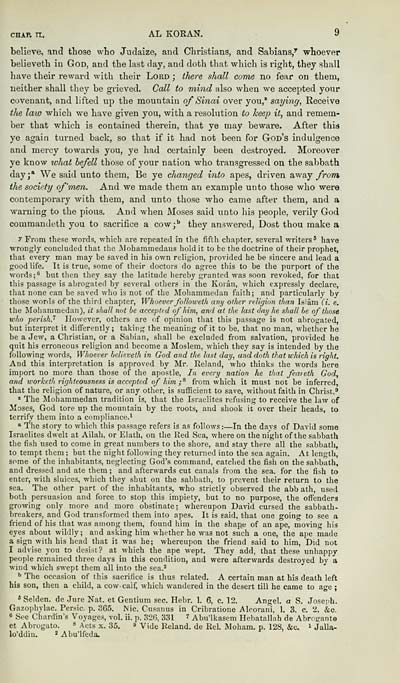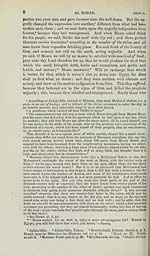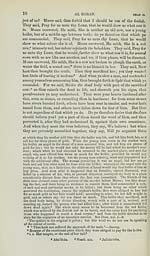Download files
Complete book:
Individual page:
Thumbnail gallery: Grid view | List view

CHAP. Ti. AL KOKAN. 9
believe, and those who Judaize, and Christians, and Sabians/ whoever
believeth in God, and the last day, and doth that which is right, they shall
have their reward with their Lord ; there shall come no fear on them,
neither shall they be grieved. Call to mind also when we accepted your
covenant, and lifted up the mountain of Sinai over you," sayiny, Receive
the law which we have given you, with a resolution to keep it, and remem-
ber that which is contained therein, that ye may beware. After this
ye again turned back, so that if it had not been for God's indulgence
and mercy towards you, ye had certainly been destroyed. Moreover
ye know lohat hefell those of your nation who transgressed on the sabbath
day;' We said unto them, Be ye changed into apes, driven away y?-077»
the society of 'men. And we made them an example unto those who were
contemporary Avith them, and unto those who came after them, and a
warning to the pious. And when Moses said unto his people, verily God
oommandeth you to sacrifice a cow;"* they answered. Dost thou make a
y From these words, which are repeated in the fifth chapter, several writers* have
wrongly concluded that the Mohammedans hold it to be the doctrine of their prophet,
that every man may be saved in his own religion, provided he be sincere and lead a
good life. It is true, some of their doctors do agree this to be the purport of the
words;* but then they say the latitude hereby granted was soon revoked, for that
this passage is abrogated by several others in the Koran, which expressly declai-e,
that none can be saved who is not of the Mohammedan faith; and particularly by
those words of the third chapter. Whoever folloiceth uni/ other religion than Islam (i. e.
the Jlohammedan), it shall not be accepted elf him, awl at the last day he shall be of those
who perishJ However, others are of opinion that this passage is not abrogated,
but interpret it differently; taking the meaning of it to be, that no man, whether he
be a Jew, a Christian, or a Sabian, shall be excluded from salvation, provided he
quit his erroneous religion and become a Moslem, which they say is intended by the
following words, Whoever believeth in God and the last day, and doth that which is right.
And this interpretation is approved by Mr. Reland, who thinks the words here
import no more than those of the apostle, In every nation he that feareth God,
and worketh righteousness is accepted of him ;^ from which it must not be inferred,
that the religion of nature, or any other, is sufficient to save, without faith in Christ."
» The Mohammedan tradition is, that the Israelites refusing to receive the law of
Moses, God tore up the mountain by the roots, and shook it over their heads, to
terrify them into a compliance.^
» The story to which this passage refers is as follows: — In the days of David some
Israelites dwelt at Allah, or Elath, on the Ked Sea, where on the night of the sabbath
the fish used to come in great numbers to the shore, and stay there all the sabbath,
to tempt them ; but the night following they returned into the sea again. At length,
some of the inhabitants, neglecting God's command, catched the fish on the sabbath,
and dressed and ate them ; and afterwards cut canals from the sea, for the fish to
enter, with sluices, which they shut on the sabbath, to prevent their return to the
sea. The other part of the inhabitants, who strictly observed the abb ath, used
both persuasion and force to stop this impiety, but to no purpose, the offenders
growing only more and more obstinate; whereupon David cursed the sabbath-
breakers, and God transformed them into apes. It is said, that one going to see a
friend of his that was among them, found him in the shape of an ape, moving his
eyes about wildly; and asking him whether he was not such a one, the aj)e made
a sign with his head that it was he; whereupon the friend said to him. Did not
I advise you to desist? at which the ape wept. They add, that these unhappy
people remained three days in this condition, and were afterwards destroyed by a
wind which swept them all into the sea.^
''The occasion of this sacrifice is thus related. A certain man at his death left
his son, then a child, a cow- calf, which wandered in the desert till he came to age ;
* Selden. de Jure Nat. et Gentium sec. Hebr. 1. 6, c. 12. Angel, a S. Joseph.
Gazophylac. Persic, p. 365. Nic. Cusanus in Cribratione Alcorani, 1. 3. c. 2, &c.
« See Cbardin's Voyages, vol. ii. p. 326, 331 7 Abu'lkasem Hebatallah de Abrreante
et Abrogate. 8 Acts x. 35. » Vide Reland. de Rel. Moham. p. 128, &c. ^ JaUa-
lo'ddin. * Abu'lfeda.
believe, and those who Judaize, and Christians, and Sabians/ whoever
believeth in God, and the last day, and doth that which is right, they shall
have their reward with their Lord ; there shall come no fear on them,
neither shall they be grieved. Call to mind also when we accepted your
covenant, and lifted up the mountain of Sinai over you," sayiny, Receive
the law which we have given you, with a resolution to keep it, and remem-
ber that which is contained therein, that ye may beware. After this
ye again turned back, so that if it had not been for God's indulgence
and mercy towards you, ye had certainly been destroyed. Moreover
ye know lohat hefell those of your nation who transgressed on the sabbath
day;' We said unto them, Be ye changed into apes, driven away y?-077»
the society of 'men. And we made them an example unto those who were
contemporary Avith them, and unto those who came after them, and a
warning to the pious. And when Moses said unto his people, verily God
oommandeth you to sacrifice a cow;"* they answered. Dost thou make a
y From these words, which are repeated in the fifth chapter, several writers* have
wrongly concluded that the Mohammedans hold it to be the doctrine of their prophet,
that every man may be saved in his own religion, provided he be sincere and lead a
good life. It is true, some of their doctors do agree this to be the purport of the
words;* but then they say the latitude hereby granted was soon revoked, for that
this passage is abrogated by several others in the Koran, which expressly declai-e,
that none can be saved who is not of the Mohammedan faith; and particularly by
those words of the third chapter. Whoever folloiceth uni/ other religion than Islam (i. e.
the Jlohammedan), it shall not be accepted elf him, awl at the last day he shall be of those
who perishJ However, others are of opinion that this passage is not abrogated,
but interpret it differently; taking the meaning of it to be, that no man, whether he
be a Jew, a Christian, or a Sabian, shall be excluded from salvation, provided he
quit his erroneous religion and become a Moslem, which they say is intended by the
following words, Whoever believeth in God and the last day, and doth that which is right.
And this interpretation is approved by Mr. Reland, who thinks the words here
import no more than those of the apostle, In every nation he that feareth God,
and worketh righteousness is accepted of him ;^ from which it must not be inferred,
that the religion of nature, or any other, is sufficient to save, without faith in Christ."
» The Mohammedan tradition is, that the Israelites refusing to receive the law of
Moses, God tore up the mountain by the roots, and shook it over their heads, to
terrify them into a compliance.^
» The story to which this passage refers is as follows: — In the days of David some
Israelites dwelt at Allah, or Elath, on the Ked Sea, where on the night of the sabbath
the fish used to come in great numbers to the shore, and stay there all the sabbath,
to tempt them ; but the night following they returned into the sea again. At length,
some of the inhabitants, neglecting God's command, catched the fish on the sabbath,
and dressed and ate them ; and afterwards cut canals from the sea, for the fish to
enter, with sluices, which they shut on the sabbath, to prevent their return to the
sea. The other part of the inhabitants, who strictly observed the abb ath, used
both persuasion and force to stop this impiety, but to no purpose, the offenders
growing only more and more obstinate; whereupon David cursed the sabbath-
breakers, and God transformed them into apes. It is said, that one going to see a
friend of his that was among them, found him in the shape of an ape, moving his
eyes about wildly; and asking him whether he was not such a one, the aj)e made
a sign with his head that it was he; whereupon the friend said to him. Did not
I advise you to desist? at which the ape wept. They add, that these unhappy
people remained three days in this condition, and were afterwards destroyed by a
wind which swept them all into the sea.^
''The occasion of this sacrifice is thus related. A certain man at his death left
his son, then a child, a cow- calf, which wandered in the desert till he came to age ;
* Selden. de Jure Nat. et Gentium sec. Hebr. 1. 6, c. 12. Angel, a S. Joseph.
Gazophylac. Persic, p. 365. Nic. Cusanus in Cribratione Alcorani, 1. 3. c. 2, &c.
« See Cbardin's Voyages, vol. ii. p. 326, 331 7 Abu'lkasem Hebatallah de Abrreante
et Abrogate. 8 Acts x. 35. » Vide Reland. de Rel. Moham. p. 128, &c. ^ JaUa-
lo'ddin. * Abu'lfeda.
Set display mode to: Large image | Transcription
Images and transcriptions on this page, including medium image downloads, may be used under the Creative Commons Attribution 4.0 International Licence unless otherwise stated. ![]()
| Early Gaelic Book Collections > J. F. Campbell Collection > Koran: or, Alcoran of Mohammed > (163) |
|---|
| Permanent URL | https://digital.nls.uk/77135888 |
|---|
| Description | Volumes from a collection of 610 books rich in Highland folklore, Ossianic literature and other Celtic subjects. Many of the books annotated by John Francis Campbell of Islay, who assembled the collection. |
|---|
| Description | Selected items from five 'Special and Named Printed Collections'. Includes books in Gaelic and other Celtic languages, works about the Gaels, their languages, literature, culture and history. |
|---|

